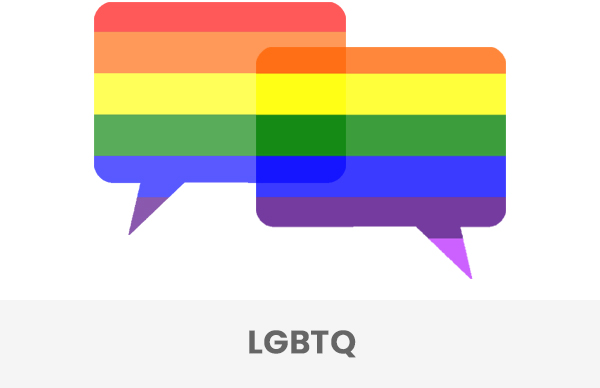If you are looking for a therapist who specializes in LGBTQ issues, you may be wondering how to find one and what to expect. It can be difficult to find a therapist who is knowledgeable and sensitive to the specific needs of LGBTQ people, but it is definitely worth the effort. In this blog post, we will discuss how to find an LGBTQ-friendly therapist and what to expect from your first appointment.
Contents
Defining LGBTQ Therapist
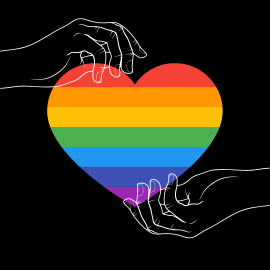
An LGBTQ therapist is a mental health professional who specializes in working with lesbian, gay, bisexual, transgender, and queer (LGBTQ) clients. They are also sometimes known as an LGBT-affirming therapist or queer-affirming therapist. LGBTQ therapists have specific training in issues that are relevant to their clients, such as coming out, discrimination, and dealing with family members who may not be supportive of their sexual orientation or gender identity.
While all therapists are trained and educated to be inclusive and non-judgmental in their practice, LGBTQ therapists have an additional level of understanding and sensitivity that can be beneficial for LGBTQ clients. It is also a must to be up-to-date with the ever-changing dynamics and terminology within the queer community.
It is also important to note that not all LGBTQ therapists identify as queer themselves. Some may be straight or cisgender (meaning, not transgender), but they have a deep understanding of and commitment to working with queer people.
What Issues Does The LGBTQ+ Community Face?
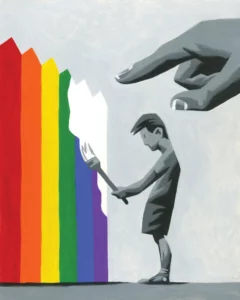
Although times have evolved and there has been a general overall acceptance of the LGBTQ+ community, there are still many challenges and issues that this group faces.
Some common issues include instances such as:
- Coming out and dealing with the reactions of family, friends, and co-workers
- Dealing with homophobia, biphobia, and transphobia
- Dealing with the stress of hiding one’s identity
- Social exclusion
- Denial of civil rights and equality
- Constant feelings of impending shame or guilt
- Being unable to be open and honest about one’s relationships
- Increase in vulnerability to unstable employment or housing
- Difficulty accessing affirming and competent medical care
- Constantly lying and living inauthentically
- Being an easy target of discrimination, harassment, and violence
- Not being able to practice safe sex
- Having to hide one’s relationship(s)
- Lack of legal protection
- Discrimination in education
- Inaccurate and inappropriate media representation
- Use of slurs or derogatory terms
- Fear of being a social outcast
- Family rejection and alienation
- Internalized homophobia, biphobia, or transphobia (meaning negative feelings towards one’s own LGBTQ+ identity)
It’s important to remember that everyone experiences these issues differently and that not all LGBTQ people experience all of these challenges. These are only a few of the issues that LGBTQ+ people face on a daily basis.
Consequences
Being a part of a minority group can come with its own set of challenges and stressors. Studies have shown that due to the discrimination and exclusion that LGBTQ people face, they are more likely to experience certain severe side effects of this unfair treatment from society. Some examples include instances such as:
Physical health problems
- chronic stress
- weakened immune system
- chest pain
- accelerated aging
- heart disease
- gastrointestinal issues
- migraines
Mental health problems
- anxiety
- depression
- eating disorders
- post traumatic stress disorder (PTSD)
- self-harm
- suicide ideation and attempts
- substance abuse
These are only a few examples, but it’s important to note that the list is not exhaustive. If you identify as LGBTQ and are struggling with any of the issues mentioned above, please reach out for help. There is no shame in seeking therapy to deal with the challenges of being part of a minority group. In fact, therapy can be an incredibly empowering experience. You deserve to live your life authentically and happily.
How LGBTQ Therapists Can Help?
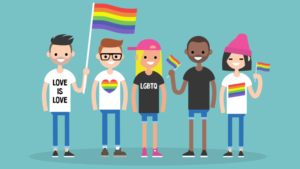
There are many reasons why someone might seek out therapy with an LGBTQ-specific focus. Some common reasons include instances such as:
- Exploring one’s sexual orientation or gender identity.
- Dealing with anxiety, depression, or other mental health issues that are exacerbated by homophobia, transphobia, or other forms of discrimination.
- Addressing family conflict arising from differing views on sexuality and/or gender identity.
- Navigating through intimate/sexual relationship problems in a non-judgmental environment.
- Exploring issues related to coming out, such as how and when to come out, and dealing with the reactions of family, friends, and others.
- Dealing with discrimination and homophobia.
- Exploring issues related to gender identity, such as transitioning or coming out as transgender.
- Resolving issues related to HIV/AIDS.
- Dealing with the unique stressors that come with being a member of the LGBTQ community.
- Working through the challenges of living in a heteronormative society.
- Seeking help for addiction or substance abuse problems that may be exacerbated by stigma and discrimination.
- Dealing with queer-centric mental disorders such as gender dysphoria or HOCD/SOCD.
All of these are valid reasons to seek out therapy. If any of the above issues resonate with you, please know that there is help available. You don’t have to suffer in silence.
How To Find An LGBTQ Therapist?
FInding an LGBTQ therapist may seem like a daunting task, but it doesn’t have to be. Here are a few tips:
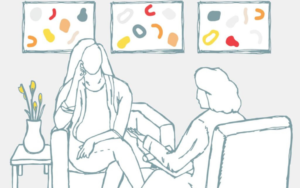
- Check out the therapist’s website or social media accounts. Many therapists now list their pronouns and/or sexual orientation on their websites or in their bios. This can help you get a sense of whether or not they would be a good fit for you.
- Ask your friends or family if they know of any LGBTQ-friendly therapists in your area. Chances are, someone you know has been in therapy before and can give you some good recommendations.
- Look for an LGBTQ-specific therapist directory online. There are many of these directories available. You may also google “LGBTQ therapist near me” to find therapists in your area. you can also check out local LGBTQ community centers or resources. They may have a list of recommended therapists that they can further refer you to.
- Once you’ve found a few potential therapists, the next step is to give them a call and ask any questions that you might have. Some things that you might want to ask about include:
-Do they have experience working with LGBTQ clients?
-Do they identify as LGBTQ themselves?
-What is their stance on conversion therapy?
-What pronouns do they use?
-Are they knowledgeable about the unique issues that LGBTQ people face?
-What is their treatment approach?
-Do they have any experience working with clients with your specific issue?
-What will be their fee?
-What does their therapy space look like? Is it LGBTQ-friendly?
- After you’ve asked all of your questions, the next step is to schedule an initial consultation. This is usually a brief meeting (30-60 minutes) where you can get a feel for the therapist and their style. It’s also an opportunity for the therapist to ask you some questions and get a better understanding of your needs.
- After the initial consultation, you can decide if you’d like to continue working with that therapist or not. If so, great! If not, that’s okay too. The most important thing is that you find a therapist who you feel comfortable with and who meets your specific needs.
When looking for an LGBTQ therapist, it’s important to find someone who is knowledgeable about the unique challenges that come with being a member of the LGBTQ community. They should also be someone who is affirming and supportive of your identity. You deserve to feel safe and accepted in therapy, and finding the right therapist can make all the difference.
What to Expect From Your First Appointment?
When you first meet with an LGBTQ therapist, they will likely ask about your pronouns (he/him/his, she/her/hers, they/them/theirs, etc.) and your preferred name. They may also ask about your sexual orientation and gender identity. This information will further help them understand how to best support you in therapy. You can expect a therapist who is LGBTQ-sensitive to be:

- Aware of the unique challenges that you may face as an LGBTQ individual.
- Has qualities of empathy, warmth, and genuineness.
- Able to provide you with a safe space to explore your identity as well as express yourself without judgment.
- Familiar with the coming out process and gender transitioning, if applicable.
- Knowledgeable about the coming out process and gender identity development.
- Familiar with the resources available to the LGBTQ community.
- Able to provide referrals to other LGBTQ-friendly professionals, if needed.
- Accepting of your sexual orientation and gender identity.
- Non-judgmental in their approach to therapy.
All of these qualities are important in order to create a safe and supportive environment for you to explore your identity and work through any challenges you may be facing. These also happen to be qualities that are important in any therapeutic relationship.
Additionally, your therapist may also ask you for a contact name and number in case of an emergency. They will likely go over their confidentiality policy with you and explain what, if anything, they are required to disclose to others.
After completing the formalities, your therapist will proceed to ask you questions about why you are seeking therapy and what your goals for therapy are. This is your opportunity to share as much or as little as you feel comfortable sharing. Your therapist will also be likely to ask you about your family, friends, work/school, and relationships. They may also ask about your mental health history, substance abuse history, and any trauma you have experienced.
If at any point during the session you feel uncomfortable or like you are not being heard, please speak up! It is important that you feel safe and supported in therapy.
After the initial assessment, your therapist will come up with a treatment plan that is tailored to your specific needs. This may involve individual therapy sessions, group therapy sessions, or a combination of both. They will also share the anticipated length of treatment with you.
If you and your therapist decide to continue working together, you will likely schedule weekly or bi-weekly appointments. These sessions will give you an opportunity to discuss any challenges you are facing and also to work towards your goals.
Therapy is a process that takes time. Once you have found an LGBTQ therapist that you feel comfortable with, be patient and trust the process. It takes time to build trust and rapport with your therapist. But if you are open and honest with them, you will likely find therapy to be a valuable experience.
Conclusion
LGBTQ individuals face many unique challenges. These difficulties can be compounded by a lack of understanding and acceptance society as a whole. Fortunately, there are many mental health professionals who are LGBTQ-sensitive and also familiar with the unique challenges that you may face.
If you are considering therapy, it is important to find a therapist who you feel comfortable with and who will provide you with a safe space to further express yourself. They should also be familiar with the resources available to the LGBTQ community.
For more information, please contact MantraCare. Online therapists are increasingly important in today’s world because they provide a convenient and accessible way for people to receive mental health support and treatment. Visit MantraCare If you are searching for “therapist near me”. Book a trial Online therapy session
